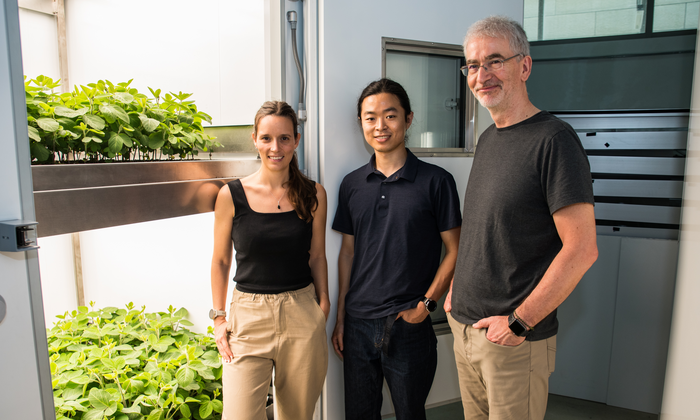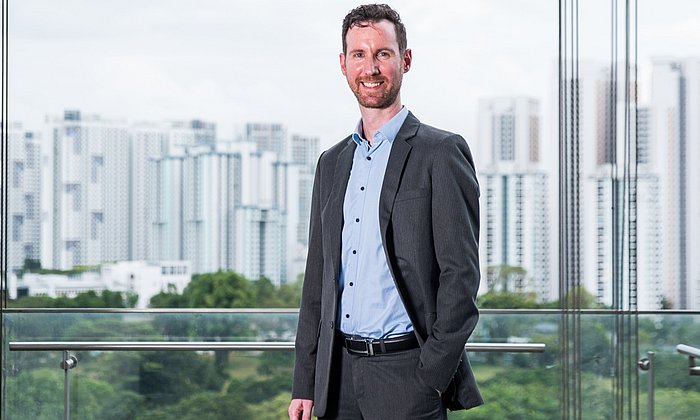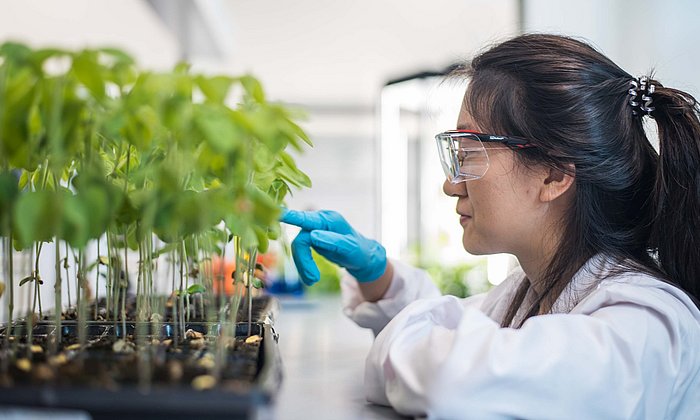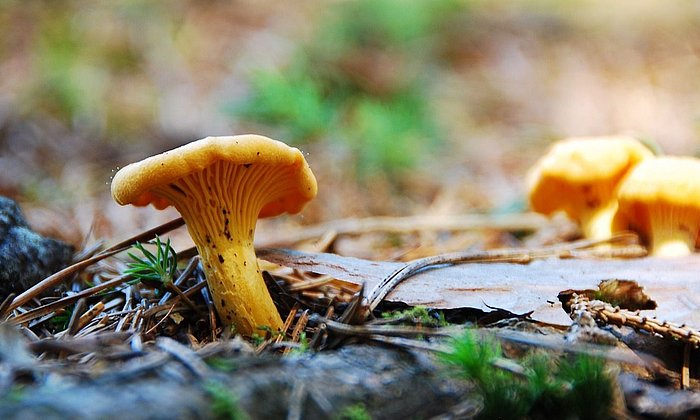NewIn: Stefan Guldin
New approaches to future nutrition
A slight fluctuation in temperature, a deviating pH value, a touch of moisture—subtle changes and low-level stimuli are all it takes to cause changes in the structure or function of soft matter. A key principle in this is molecular self-organization, a process where tiny nano-scale building blocks such as proteins or polymers automatically aggregate into ordered structures, flexibly aligning themselves to their environment.
The process may sound abstract but has a host of practical applications, from medical diagnostics and sustainable water purification to the development of plant-based meat alternatives. As Stefan Guldin explains, “At my Chair, for example, biosensors that bind very specifically to certain viruses and bacterial components – allowing for reliable detection of diseases and contaminants. In environmental engineering, we work on membranes that purify water from salts, pollutants, and heavy metals. And new approaches to future nutrition are being created at the interface with food technology.”
Meat alternatives for Singapore
Stefan Guldin is currently juggling active roles at two TUM locations; alongside his chair at the Weihenstephan campus, he is Scientific Co-Director at TUMCREATE in Singapore. In the Proteins4Singapore project based there, he is researching into processing plant-based proteins to create sustainable and convincingly flavorful alternatives to meat.
From a global perspective, the significance of plant-based proteins extends far beyond individuals’ personal decision to stop eating meat. Amid the progress of climate change and continued population growth, nutritious and sustainably produced foods are becoming increasing important. “Agriculture is responsible for a significant part of greenhouse gas emissions. If we can manage to replace at least some animal proteins with plant-based protein sources, we can reduce the industry’s ecological footprint significantly,” urges Stefan Guldin.
Although the market for meat analogues has grown over recent years, plant-based protein alternatives are not yet widespread. “The products on the shelves are often heavily processed,” warns Stefan Guldin. “Anyway, flavorful food involves a whole lot more than simply the right seasoning.”
Taste and texture
For an all-round taste experience, a food must combine various factors: aroma, flavor, and the sensory experience on the tongue. “Our goal is to develop plant-based meat alternatives that are as natural as possible and barely distinguishable from meat in terms of flavor.” The Singapore-based team is working on removing undesirable flavors from the plant proteins, using methods including fermentation and enzyme treatment. At the same time, Stefan Guldin is drawing on his expertise in order to make targeted improvements to the consistency of meat alternatives by generating controlled formation of micro- and nanoscale structures.
“My priority is to pursue open, bold issues with determination. That line of action may not always pay off, but from a long-term perspective, it would be a shame to squander genuine innovative potential merely making minor adjustments,” says Stefan Guldin.
Stefan Guldin is Professor of Complex Soft Matter at the Technical University of Munich (TUM). He studied at the Karlsruhe Institute of Technology (KIT) and at TUM, specialising in soft condensed matter. In 2012, he completed his PhD at the Cavendish Laboratory of the University of Cambridge and subsequently conducted postdoctoral research at the École Polytechnique Fédérale de Lausanne (EPFL). From 2015 onward, he held various positions at University College London, becoming Full Professor in 2022. In 2024, he was appointed to TUM, where he now holds the Chair of Complex Soft Matter at the TUM School of Life Sciences. He is currently also serving as Scientific Co-Director of the Proteins4Singapore project at TUMCREATE and lives in Singapore with his family until mid-2026.
This article was published in the 02/2025 issue of the new TUM Magazine.
- The Chair of Complex Soft Matter is part of the TUM School of Life Sciences.
- All episodes of the series NewIn
- TUMCREATE is the multidisciplinary research platform of the Technical University of Munich (TUM) on the Singapore Campus for Research Excellence and Technological Enterprise (CREATE). Together with international and local partner universities, public and private research institutions, and industrial partners, its researchers are driving forward future technologies: Since 2010, TUMCREATE has been conducting research in Singapore on topics such as electromobility, autonomous transportation systems, and imaging techniques in medical technology. Since its start in April 2022, the consortium of Proteins4Singapore is expanding TUMCREATE’s portfolio with a comprehensive food science and technology project. The research focuses on alternative and sustainable protein sources and the function-oriented production of protein-rich foods. Proteins4Singapore aims at enabling urban centres such as Singapore to produce highly nutritious, tasty and functional protein-based foods
Contacts to this article:
Prof. Dr. Stefan Guldin
Technical University of Munich
Chair of Complex Soft Matter
guldin@tum.de



